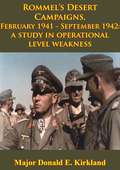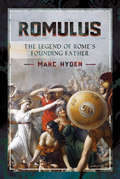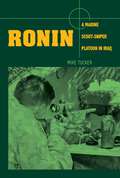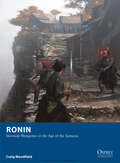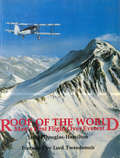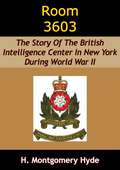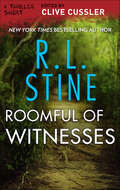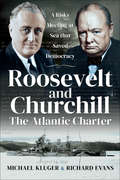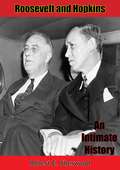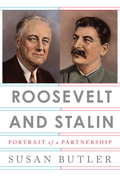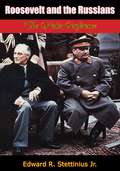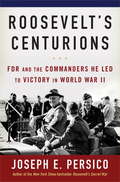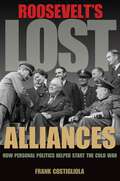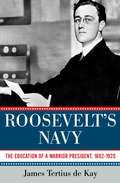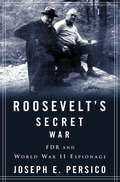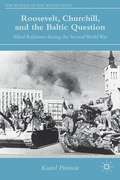- Table View
- List View
Rommel, Operational Art And The Battle Of El Alamein
by Cmdr Mark A. Machin USNField Marshal Rommel's North African Campaign demonstrates many of the limitations and restricting factors of modern warfare. Examining the Axis Alliance preparation, implementation and sustainment of its operations provides insight applicable to the warfare commander of today. Relevancy is obtained through analysis of the Axis coalition command and control structure, tactical battle operations, strategic strategy, weapon technology, use of intelligence and logistical support network. Rommel's successful offensive through Libya and Egypt was ended at the Battle of El Alamein due to the critical influence of these factors. His exploits demonstrate excellence of battlefield tactics at the expense of strategic strategy and logistical sustainment.
Rommel: A Reappraisal
by Ian F. BeckettHow should history judge the life and career of Erwin Rommel, the most famous German general of the Second World War, seventy years after his death on 14 October 1944? In his own time and in the years immediately after the war his reputation as a great and chivalrous commander grew to the point where it took on almost legendary proportions, and the legend is still with us today. His apparent support for the plot to remove Hitler from power in 1944 and the manner of his death, committing suicide in order to protect his family from Nazi retribution, further enhanced his image as an honourable, professional soldier.But does he deserve this legendary status? Can his exploits as a soldier and commander and his conduct of the war be separated from the aggressive aims of Hitler and the Nazis whom he and the German army served?These are among the key questions Ian Beckett and his team of expert contributors seek to answer in this stimulating and timely study of Rommel and his legacy. They look critically at every stage of Rommel's brilliant career, from the early fame he achieved as a daring young officer fighting on the Italian front in the First World War, through his exploits as a panzer leader during the German invasion of France in 1940, and his generalship in the Western Desert when he commanded the German and Italian forces fighting the British. These achievements and the publicity that went with them gave him an extraordinary, perhaps overinflated reputation within Germany and among the opposing Allies.As featured in Cornwall Today.
Rommel’s Desert Campaigns, February 1941-September 1942: A Study In Operational Level Weakness [Illustrated Edition]
by Major Donald E. KirklandIncludes the War in North Africa Illustration Pack - 112 photos/illustrations and 21 maps.This study is a historical analysis to determine why Rommel's tactical success on the battlefield could not accomplish strategic objectives in North Africa. Rommel's operations are reviewed from his arrival in North Africa in February 1941 through his last offensive to destroy the British Eighth Army at Alamein in August-September 1942. The study compares his ability to conduct tactical operations with his apparent inability to plan and execute actions at the operational level of war. Rommel's problems with operational planning are addressed within the scope of campaign planning principles set forth in FM 100-5, Operations, (Final Draft). His planning is expressly judged on how he shaped his operational plans by using the concepts of aims, resources, constraints, and restrictions to conform to strategic guidance. Rommel's tactical execution is contrasted with his operational performance. This comparison is based on the AirLand Battle tenets of agility, initiative, depth, and synchronization. The study concludes that Rommel's failure lies in planning operations that exceeded his resources and conducting needless operations that resulted in the loss of the initiative at the decisive point. Rommel's plans exceeded the strategic objectives desired by the theater strategists. His execution was ultimately defeated by his quest for tactical victories without regard to how they contributed to achieving campaign objectives. Rommel's weakness at the operational level led to failure to sequence tactical victories to achieve campaign goals. This failure illustrates the importance of understanding how operational art orchestrates tactical activities to achieve strategic objectives within a theater of operations.
Romulus: The Legend of Rome's Founding Father
by Marc HydenA riveting biography of the legendary founder and first king of Rome.According to legend, Romulus was born to a Vestal Virgin and left for dead as an infant near the Tiber River. His life nearly ended as quickly as it began, but fate had other plans. A humble shepherd rescued the child and helped raise him into manhood. As Romulus grew older, he fearlessly engaged in a series of perilous adventures that ultimately culminated in Rome’s founding, and he became its fabled first king.Establishing a new city had its price, and Romulus was forced to defend the nascent community. As he tirelessly safeguarded Rome, Romulus proved that he was a competent leader and talented general. Yet, he also harbored a dark side, which reared its head in many ways and tainted his legacy, but despite all of his misdeeds, redemption and subsequent triumphs were usually within his grasp. Indeed, he is an example of how greatness is sometimes born of disgrace.Regardless of his foreboding flaws, Rome allegedly existed because of him and became massively successful. As the centuries passed, the Romans never forgot their celebrated founder.This is the story that many ancient Romans believed.Praise for Romulus“Hyden leans into a tone reminiscent of a bard regaling those around a campfire with stories of a hero’s great exploits . . . [He tells] a fascinating origin story.” —Booklist“As inherently fascinating a read as it is an impressive work of meticulous scholarship . . . a truly extraordinary, expressly informative, and highly recommended addition to personal, professional, community, college, and university library Roman History & Culture collections and supplemental curriculum studies reading lists.” —Midwest Book Review
Ronin - Skirmish Wargames in the Age of the Samurai
by Craig Woodfield Jose Daniel PenaRonin is a set of skirmish wargame rules set in late 16th century feudal Japan. Players build small warbands of models and battle each other as well as non-player factions in duels and skirmishes. Ronin is historically accurate, but also pays tribute to the films of Akira Kurosawa such as Seven Samurai and Yojimbo.Despite the enduring popularity of this period, there are very few widely available historical samurai skirmish wargames rules sets. Figures for the period are increasingly available, particularly from Perry Miniatures (very high quality 28mm metal), Wargames Factory (plastic 28mm box sets) and Zvezda (1/72 plastic). Ronin seeks to fill this void with an enjoyable system that is easy and cheap to take up. Gameplay is based upon a d6 system that forces players to make tactical decisions about attack and defence, simulating the cut and thrust of hand-to-hand combat.There are numerous player factions, from Samurai and Ashigaru, the professional soldiers of the period, to Buddhist warrior monks, martial arts schools, and bandits.There are also swords for hire such as Ronin and ninja that players can hire to augment their warband.Players design their warband using a points system, and assign each model weapons, armour and martial skills. Weapons include the yari (pike/spear), naginata (pole arm), yumi (bow), arquebus and of course the katana and its variants. Specialist skills allow a model to undertake various special actions (for example, arrow-cutter provides additional defence against bow fire) or increases the proficiency of the model with a specific weapon.As well as straight warband-on-warband battles, there are specific scenarios, some of them linked to provide a loose narrative. Gameplay is based upon a d6 system that forces players to make tactical decisions about attack and defence, simulating the cut and thrust of hand-to-hand combat. One scenario features the warband defending a notable person from attack by ninjas, another the defence of a village against bandits. There are also campaign rules that allow for the development of a warband in terms of gaining new skills and equipment and planning on-going battles against other players. Finally, very simple guidelines for running a tournament are included.
Roof of the World: Man's First Flight Over Everest
by Lord James Douglas-HamiltonOn the morning of 3 April 1933, two single-engine biplanes set off on a flight into history. From their base near the Indian border with the mystery country of Nepal, the two young pilots, one a British Marquis and a Scottish Member of Parliament, the other a dynamic flight commander, flew towards as great a challenge as world aviation had faced to date - Mount Everest, 'Roof of the World'.The first flight over Everest was the climax of years of thought and months of intensive planning, an epoch-making event which caught the imagination of millions. News of its success reverberated throughout the British Empire to the world at large. Among the deluge of telegrams of congratulations received were those from the King and the Prime Minister. The Times of London, which had given exclusive coverage of the Expedition since its early days, carried one of its longest features ever and was excited enough to comment that the achievement was 'almost like exploring the rainbow'. Some half-a-century later that Houston-Mount Everest Expedition takes its place as one of the last great pioneering flights before the era of space travel.Roof of the World tells the remarkable story of that flight and its repercussions, among which were the growth of the British aviation industry and the creation of the country's second international airport. Using rare and unique photographs, many taken from the flight itself and giving an idea of the qualities required of the crews, Lord James Douglas-Hamilton has recreated the scene facing the pilots, one of whom was his father. He has had access to relevant diaries and personal papers presents in Roof of the World a valuable contribution to our understanding of a unique achievement in an eventful decade.
Room 3603: The Story Of The British Intelligence Center In New York During World War II
by Ian Fleming H. Montgomery HydeThe story of the British Intelligence Center in New York during World War IIWith headquarters in New York at 630 Fifth Avenue, Room 3603, the organization known as the British Security Coordination, or B.S.C., was the keystone of the successful Anglo-American partnership in the field of secret intelligence, counterespionage and "special operations."The man chosen by Sir Winston Churchill to set up and direct this crucial effort was Sir William Stephenson. A fighter pilot in the First World War, he had become a millionaire before he was thirty through his invention of the device for transmitting photographs by wireless. The late General Bill Donovan, director of the Office of Strategic Services, said of him; "Bill Stephenson taught us all we ever knew about foreign intelligence."Sir William Stephenson has now put all his papers and much other relevant material at the disposal of H. Montgomery Hyde, a member of his wartime organization who knows him intimately. The result is a unique picture of the British Secret Service in action and of the remarkable exploits of its brilliant but personally unobtrusive chief in the United States.At the end of the war, J. Edgar Hoover, with whom Stephenson worked closely, wrote to him: "When the full story can be told, I am quite certain that your contribution will be among the foremost in having brought victory finally to the united nations' cause" Now it can be told; Room 3603 is the full story.Ian Fleming's delightful Foreword adds this information: "Bill Stephenson worked himself almost to death during the war, carrying out undercover operations and often dangerous assignments (they culminated with the Gouzenko case that put Fuchs in the bag) that can only be hinted at in the fascinating book that Mr. Montgomery Hyde has, for some reason, been allowed to write--the first book, so far as I know, about the British secret agent whose publication has received official blessing."
Room Full of Mirrors: A Biography of Jimi Hendrix
by Charles R. Cross'Charles R. Cross has got as close to the truth as anyone yet in his exhaustive and ground-breaking account of the life of the greatest guitarist in the history of rock.' Observer'Superb'Sunday TelegraphJimi Hendrix continues to fascinate, and sell huge quantities of albums, even 35 years after his death. Quite apart from his influence on musicians and fans, a large part of the appeal of his sensational life story lies in the thrill of the era whose values he came to stand for. The Sixties still exert a massive pull over pop culture and this is genuinely a book for anyone interested, not only in Hendrix but also in anything to do with the pop culture of the last 40 years.Meticulously researched and sensitively and beautifully written, this is a labour of love that reveals the nuances, foibles and tragedies of the human being behind the iconic image.This is the sweeping, authoritative and colourful biography that Jimi Hendrix and that his legions of fans, young and old deserves.
Room for One More
by Monique PolakFor twelve-year-old Rosetta Wolfson, the war in Europe seems very far off from her home in Canada. Then Mr. Schwartzberg comes to tea and asks Rosetta's parents if they will take in a young war refugee. Isaac joins the family and becomes a ready-made brother to Rosetta and her two sisters. Isaac's arrival brings change. Her best friend's handsome brother doesn't seem as attractive after he reveals himself as anti-Semitic, and Rosetta begins to suspect her friend may agree with him. As Rosetta and Isaac become friends and he shares his story with her, she helps him learn the fate of other family members and helps him shape a promising future in his new country.
Room in the Heart
by Sonia LevitinJulie lives with the constant, nagging fear that her family will be sent to a concentration camp. Niels can't stand the brutish, arrogant Nazi soldiers and finds himself drawn to the Danish resistance. When Niels learns of the Nazi plot to round up all of Copenhagen's Jews, he is dominated by a single thought: rescue. Julie wonders how she will endure so many good-byes, especially to Niels. This riveting read is based on the true story of how thousands of Denmark's Jews were saved from the Nazis.
Roomful of Witnesses (The Thriller Shorts)
by R. L. StinePrepare for edge-of-your-seat suspense in this Thriller Short.Originally published in THRILLER 2 (2009),edited by #1 New York Times bestselling author Clive Cussler.In this compelling Thriller Short from bestselling author R.L. Stine, a man discovers what can happen when hostility gets the best of him. For former convicts Wayne Mullet and Leon Maloney, working at a retirement home for chimpanzees located in the Louisiana woods is a step up from prison life. Their jobs at The Haven aren’t the greatest. Still, Wayne wants to keep his. But when Leon takes his resentment out on two old dudes, Leon gets what’s coming to him. Unfortunately, though, it’s Wayne who’s left holding the bag in a room full of witnesses.Don’t miss any of these exciting stories from Thriller 2: The Weapon by Jeffery DeaverRemaking by Blake CrouchIced by Harry HunsickerJustice Served by Mariah StewartThe Circle by David HewsonRoomful of Witnesses by R.L. StineThe House on Pine Terrace by Phillip MargolinThe Desert Here and the Desert Far Away by Marcus SakeyOn the Run by Carla NeggersCan You Help Me Out Here? by Robert FerrignoCrossed Double by Joe HartlaubThe Lamented by Lawrence LightVintage Death by Lisa JacksonSuspension of Disbelief by Tim MaleenyA Calculated Risk by Sean ChercoverThe Fifth World by Javier SierraGhost Writer by Gary BraverThrough a Veil Darkly by Kathleen AntrimBedtime for Mr. Li by David J. MontgomeryProtecting the Innocent by Simon WoodWatch Out for My Girl by Joan JohnstonKilling Time by Jon LandBoldt’s Broken Angel by Ridley Pearson
Roosevelt and Churchill: A Risky Meeting at Sea that Saved Democracy
by Richard J. Evans Michael KlugerThe dramatic secret meeting between Churchill and FDR that forged their alliance against global fascism is brought to life in this WWII history.On August 14, 1941, Prime Minister Winston Churchill and President Franklin D. Roosevelt issued a joint declaration of goals for the world after the Second World War. The Atlantic Charter was a powerful statement against tyranny and an important display of the “Special Relationship” between the UK and the US.Roosevelt and Churchill: The Atlantic Charter tells the story behind this momentous document and the secret meeting that led to its creation. Churchill and Roosevelt barely knew each other when they met off the coast of Newfoundland aboard the USS Augusta. After a desperate dash across the U-boat infested Atlantic, Churchill spent four days at sea with Roosevelt, establishing both a personal friendship and an international alliance that would change the world.Exploring the lives of both men, the authors also include biographies of those who were vital to the process: Roosevelt’s Secretary of Commerce Harry Hopkins and foreign policy advisor Sumner Welles; and Churchill’s confidants Lord Beaverbrook, Lord Cadogan, and his son Randolph Churchill.
Roosevelt and Churchill: A Risky Meeting at Sea that Saved Democracy
by Richard J. Evans Michael KlugerThe dramatic secret meeting between Churchill and FDR that forged their alliance against global fascism is brought to life in this WWII history.On August 14, 1941, Prime Minister Winston Churchill and President Franklin D. Roosevelt issued a joint declaration of goals for the world after the Second World War. The Atlantic Charter was a powerful statement against tyranny and an important display of the “Special Relationship” between the UK and the US.Roosevelt and Churchill: The Atlantic Charter tells the story behind this momentous document and the secret meeting that led to its creation. Churchill and Roosevelt barely knew each other when they met off the coast of Newfoundland aboard the USS Augusta. After a desperate dash across the U-boat infested Atlantic, Churchill spent four days at sea with Roosevelt, establishing both a personal friendship and an international alliance that would change the world.Exploring the lives of both men, the authors also include biographies of those who were vital to the process: Roosevelt’s Secretary of Commerce Harry Hopkins and foreign policy advisor Sumner Welles; and Churchill’s confidants Lord Beaverbrook, Lord Cadogan, and his son Randolph Churchill.
Roosevelt and Hopkins: An Intimate History
by Robert Emmet SherwoodOriginally published in 1948, this book offers a rare insight into the workings of FDR’s wartime diplomacy. It is a classic account of FDR’s foreign policy during World War II and examines how Harry Hopkins, his friend and confidant, became the president’s “point man” with Stalin, Churchill, de Gaulle, and other allied leaders.The inside history of America’s inevitable wartime rise as a great power, written in a wonderfully readable prose by White House speechwriter and prize-winning playwright Robert Sherwood, this biography won the 1949 Pulitzer Prize and a 1949 Bancroft Prize.Richly illustrated throughout.
Roosevelt and Stalin
by Susan ButlerA hugely important book that solely and fully explores for the first time the complex partnership during World War II between FDR and Stalin, by the editor of My Dear Mr. Stalin: The Complete Correspondence of Franklin D. Roosevelt and Joseph V. Stalin ("History owes a debt to Susan Butler for the collection and annotation of these exchanges"--Arthur Schlesinger, Jr).Making use of previously classified materials from the Russian State Archive of Social and Political History, and the Archive of the Foreign Policy of the Russian Federation, as well as the Franklin D. Roosevelt Library and three hundred hot war messages between Roosevelt and Stalin, Butler tells the story of how the leader of the capitalist world and the leader of the Communist world became more than allies of convenience during World War II. Butler reassess in-depth how the two men became partners, how they shared the same outlook for the postwar world, and how they formed an uneasy but deep friendship, shaping the world's political stage from the war to the decades leading up to and into the new century.Roosevelt and Stalin tells of the first face-to-face meetings of the two leaders over four days in December 1943 at Tehran, in which the Allies focused on the next phases of the war against the Axis Powers in Europe and Asia; of Stalin's agreement to launch another major offensive on the Eastern Front; and of his agreement to declare war against Japan following the Allied victory over Germany. Butler writes of the weeklong meeting at Yalta in February of 1945, two months before Roosevelt's death, where the unconditional surrender of Nazi Germany was agreed on and postwar Europe was reorganized, and where Stalin agreed to participate in Roosevelt's vision of the United Nations.The book makes clear that Roosevelt worked hard to win Stalin over, pursuing the Russian leader, always holding out the promise that Roosevelt's own ideas were the best bet for the future peace and security of Russia; however, Stalin was not at all sure that Roosevelt's concept of a world organization, even with police powers, would be enough to keep Germany from starting a third world war, but we see how Stalin's view of Roosevelt evolved, how he began to see FDR as the key to a peaceful world. Butler's book is the first to show how FDR pushed Stalin to reinstate religion in the Soviet Union, which he did in 1943; how J. Edgar Hoover derailed the U.S.-planned establishment of an OSS intelligence mission in Moscow and a Soviet counterpart in America before the 1944 election; and that Roosevelt had wanted to involve Stalin in the testing of the atomic bomb at Alamogardo, New Mexico.We see how Roosevelt's death deeply affected Stalin. Averell Harriman, American ambassador to the Soviet Union, reported that the Russian premier was "more disturbed than I had ever seen him," and said to Harriman, "President Roosevelt has died but his cause must live on. We shall support President Truman with all our forces and all our will." And the author explores how Churchill's--and Truman's--mutual mistrust and provocation of Stalin resulted in the Cold War.A fascinating, revelatory portrait of this crucial, world-changing partnership.From the Hardcover edition.
Roosevelt and the Russians: The Yalta Conference
by Edward R. Stettinius Jr.Ever since the Big Three—Roosevelt, Churchill and Stalin—had their historic meeting in the Crimea, controversy has raged about the decisions, concessions, and agreements which took place there. It is important, in the light of subsequent world history, to know what really happened at Yalta. Now, for the first time, the entire story of those seven days in the history of the world—February 4-11, 1945—is brilliantly revealed by Edward R. Stettinius who, as Secretary of State, sat in on all the meetings that took place, and who, since the deaths of Roosevelt and Harry Hopkins, is perhaps the only man who can tell all that happened at Yalta.
Roosevelt's Centurions: FDR and the Commanders He Led to Victory in World War II
by Joseph E. PersicoAll American presidents are commanders in chief by law. Few perform as such in practice. In Roosevelt's Centurions, distinguished historian Joseph E. Persico reveals how, during World War II, Franklin D. Roosevelt seized the levers of wartime power like no president since Abraham Lincoln during the Civil War. Declaring himself "Dr. Win-the-War," FDR assumed the role of strategist in chief, and, though surrounded by star-studded generals and admirals, he made clear who was running the war. FDR was a hands-on war leader, involving himself in everything from choosing bomber targets to planning naval convoys to the design of landing craft. Persico explores whether his strategic decisions, including his insistence on the Axis powers' unconditional surrender, helped end or may have prolonged the war. Taking us inside the Allied war councils, the author reveals how the president brokered strategy with contentious allies, particularly the iron-willed Winston Churchill; rallied morale on the home front; and handpicked a team of proud, sometimes prickly warriors who, he believed, could fight a global war. Persico's history offers indelible portraits of the outsize figures who roused the "sleeping giant" that defeated the Axis war machine: the dutiful yet independent-minded George C. Marshall, charged with rebuilding an army whose troops trained with broomsticks for rifles, eggs for hand grenades; Dwight Eisenhower, an unassuming Kansan elevated from obscurity to command of the greatest fighting force ever assembled; the vainglorious Douglas MacArthur; and the bizarre battlefield genius George S. Patton. Here too are less widely celebrated military leaders whose contributions were just as critical: the irascible, dictatorial navy chief, Ernest King; the acerbic army advisor in China, "Vinegar" Joe Stilwell; and Henry H. "Hap" Arnold, who zealously preached the gospel of modern air power. The Roosevelt who emerges from these pages is a wartime chess master guiding America's armed forces to a victory that was anything but foreordained. What are the qualities we look for in a commander in chief? In an era of renewed conflict, when Americans are again confronting the questions that FDR faced--about the nature and exercise of global power--Roosevelt's Centurions is a timely and revealing examination of what it takes to be a wartime leader in a freewheeling, complicated, and tumultuous democracy.Advance praise for Roosevelt's Centurions "[A] sweeping, top-down account of 1939-45 from the point of view of FDR, his cabinet and his leading generals and admirals. . . . Long wars demand long books, but these are 550 pages of lively prose by a good writer who knows his subject."--Kirkus Reviews "When I was a boy growing up in the South Bronx, my heroes were Roosevelt's centurions. As a soldier for thirty-five years, I made them my mentors and models. These men were heroes. They were fallible and occasionally vain, but we were certainly blessed to have such Americans leading the Greatest Generation during the world's greatest conflict. Of course, the greatest centurion of them all was FDR himself, who knew how to lead his commanders, stroke their egos, and get the best from them, yet never left any doubt as to who was commander in chief. Joe Persico, my valued collaborator on my memoirs, has brought his formidable talents to bear to bring the centurions to life. He is at the top of his game in this defining classic."--Colin L. Powell, General, U.S. Army (Retired).
Roosevelt's Lost Alliances: How Personal Politics Helped Start the Cold War
by Frank CostigliolaHow the Grand Alliance of World War II succeeded—and then collapsed—because of personal politicsIn the spring of 1945, as the Allied victory in Europe was approaching, the shape of the postwar world hinged on the personal politics and flawed personalities of Roosevelt, Churchill, and Stalin. Roosevelt's Lost Alliances captures this moment and shows how FDR crafted a winning coalition by overcoming the different habits, upbringings, sympathies, and past experiences of the three leaders. In particular, Roosevelt trained his famous charm on Stalin, lavishing respect on him, salving his insecurities, and rendering him more amenable to compromise on some matters.Yet, even as he pursued a lasting peace, FDR was alienating his own intimate circle of advisers and becoming dangerously isolated. After his death, postwar cooperation depended on Harry Truman, who, with very different sensibilities, heeded the embittered "Soviet experts" his predecessor had kept distant. A Grand Alliance was painstakingly built and carelessly lost. The Cold War was by no means inevitable.This landmark study brings to light key overlooked documents, such as the Yalta diary of Roosevelt's daughter Anna; the intimate letters of Roosevelt's de facto chief of staff, Missy LeHand; and the wiretap transcripts of estranged adviser Harry Hopkins. With a gripping narrative and subtle analysis, Roosevelt's Lost Alliances lays out a new approach to foreign relations history. Frank Costigliola highlights the interplay between national political interests and more contingent factors, such as the personalities of leaders and the culturally conditioned emotions forming their perceptions and driving their actions. Foreign relations flowed from personal politics—a lesson pertinent to historians, diplomats, and citizens alike.
Roosevelt's Navy: The Education of a Warrior President, 1882-1920
by James Tertius de KayFDR as never seen before: His formative years as Woodrow Wilson's Assistant Secretary of the Navy, evolving from political neophyte to visionary leader. This is the story of a very different Franklin Delano Roosevelt from the one traditionally found in the history books. This is a much younger, untested, pre-polio FDR, learning the complexities of gaining and exercising power as Woodrow Wilson's ambitious Assistant Secretary of the Navy. He arrives in Washington as an inexperienced political amateur possessed of little more than a famous name, but by the time he leaves the Navy eight years later he will have transformed himself into a seasoned professional, wise to the ways of power, a visionary ready and eager to take his place on the world stage. FDR's early years in Washington also include the most tumultuous period in his personal life, when, caught in a difficult marriage, he is forced to choose between his own personal happiness and his political ambitions. He must deal at close quarters with Congress, with the Administration, and with the military. Lastly, but crucially, he confronts himself, learning something about his potential, his limitations, and his growing ambition to become president of the United States.
Roosevelt's Rough Riders
by Stephen Walsh Alejandro QuesadaOsprey's examination of the brief but colorful history of the 1st US Volunteer Cavalry, detailing the rich experiences of the men who fought in its ranks. Founded in May 1898, the unit's actions in Cuba during the Spanish-American War (1898) have passed into military and national legend. The men who volunteered for the force came from a broad spectrum of American society, including seasoned ranch hands and cowboys, college athletes, and policemen. The unit was posted to Cuba in June 1898, where the 1st US Volunteer Cavalry fought in the battles of Las Guasimas, Kettle Hill and San Juan Hill. At this time, its commander, Colonel Leonard Wood, took charge of the US 2nd Cavalry Brigade, leaving Theodore Roosevelt to assume command of the 1st US Volunteer Cavalry. The unit subsequently became known as 'Roosevelt's Rough Riders', after Buffalo Bill's popular cowboy show that featured 'Rough Riders of the World'. Many of the volunteers were struck down by disease and sickness during the campaign, and the unit was eventually withdrawn, returning to a hero's welcome in the US. The last veteran of the unit died in 1975, but a rich body of source material has survived, and much of this is covered in this fascinating work.
Roosevelt's Secret War: FDR and World War II Espionage
by Joseph E. PersicoDespite all that has already been written on Franklin Delano Roosevelt, Joseph Persico has uncovered a hitherto overlooked dimension of FDR's wartime leadership: his involvement in intelligence and espionage operations.Roosevelt's Secret War is crowded with remarkable revelations:-FDR wanted to bomb Tokyo before Pearl Harbor-A defector from Hitler's inner circle reported directly to the Oval Office-Roosevelt knew before any other world leader of Hitler's plan to invade Russia-Roosevelt and Churchill concealed a disaster costing hundreds of British soldiers' lives in order to protect Ultra, the British codebreaking secret-An unwitting Japanese diplomat provided the President with a direct pipeline into Hitler's councilsRoosevelt's Secret War also describes how much FDR had been told--before the Holocaust--about the coming fate of Europe's Jews. And Persico also provides a definitive answer to the perennial question Did FDR know in advance about the attack on Pearl Harbor?By temperament and character, no American president was better suited for secret warfare than FDR. He manipulated, compartmentalized, dissembled, and misled, demonstrating a spymaster's talent for intrigue. He once remarked, "I never let my right hand know what my left hand does." Not only did Roosevelt create America's first central intelligence agency, the OSS, under "Wild Bill" Donovan, but he ran spy rings directly from the Oval Office, enlisting well-placed socialite friends. FDR was also spied against. Roosevelt's Secret War presents evidence that the Soviet Union had a source inside the Roosevelt White House; that British agents fed FDR total fabrications to draw the United States into war; and that Roosevelt, by yielding to Churchill's demand that British scientists be allowed to work on the Manhattan Project, enabled the secrets of the bomb to be stolen. And these are only a few of the scores of revelations in this constantly surprising story of Roosevelt's hidden role in World War II.
Roosevelt, Churchill, and The Baltic Question: Allied Relations during the Second World War (The World of the Roosevelts)
by Kaarel PiirimäeIn 1940, the USSR occupied and annexed Estonia, Latvia, and Lithuania, leading to calls by many that the Soviets had violated international law. This book examines British, US, and Soviet policies toward the Baltic states, placing the true significance of the Baltic question in its proper geopolitical context.
Roosevelt, Franco, and the End of the Second World War (The World of the Roosevelts)
by Joan Maria ThomàsThis book is a study of the relations between the US and Spain, particularly during the period from 1943 to 1945, when the Roosevelt Administration and the Joint Chiefs of Staff decided to challenge the Pro-Franco Regime, culminating in the Battle of Wolfram and the embargo of petroleum products.
Roosevelt’s Road to Russia (Fdr And The Era Of The New Deal Ser.)
by George N. CrockerMany people will be made angry by this book. They will be angry first at its author for daring to attack the memory of Franklin Delano Roosevelt. Then, as they read with an increasing sense of shame this shocking story of the summit conferences of World War II, they will be moved to anger at F.D.R. himself.The trust which the American people bestowed in the leadership of Roosevelt is a matter of historical record. The manner in which the four-times President used that trust is only little by little coming to be realized.The truth is that ever since “victory” was won, western civilization has been at bay, with men everywhere preparing for new wars. What went wrong? Was there a monstrous miscalculation? Bad faith in high places? Incompetence? What really happened at the fateful summit conferences of World War II? The documents, notes, and memoirs of men who were there—at Casablanca, Teheran, and Yalta and the others—how now dredged up the pieces of a horrendous jigsaw puzzle. ROOSEVELT’S ROAD TO RUSSIA, for the first time, puts the pieces together.“Crocker has presented this sad epoch in American history more interestingly and more competently than any previous writer…[he] gives the first complete picture of just how and why we lost the peace…[it] is an important contribution to the history of our times. We are in danger of being deceived by Khrushchev as Roosevelt was deceived by Stalin. Let us read this record as Crocker has faithfully compiled it and heed the warning!”—H. V. Kaltenhorn“A tale of colossal incompetence, monstrous misunderstanding, outrages of freedom...it should be read by everyone who wants to understand the world today.”—The Chicago Tribune“…a scholarly brief with all the logic and persuasion of a grand jury presentation…”—Columbus Dispatch


